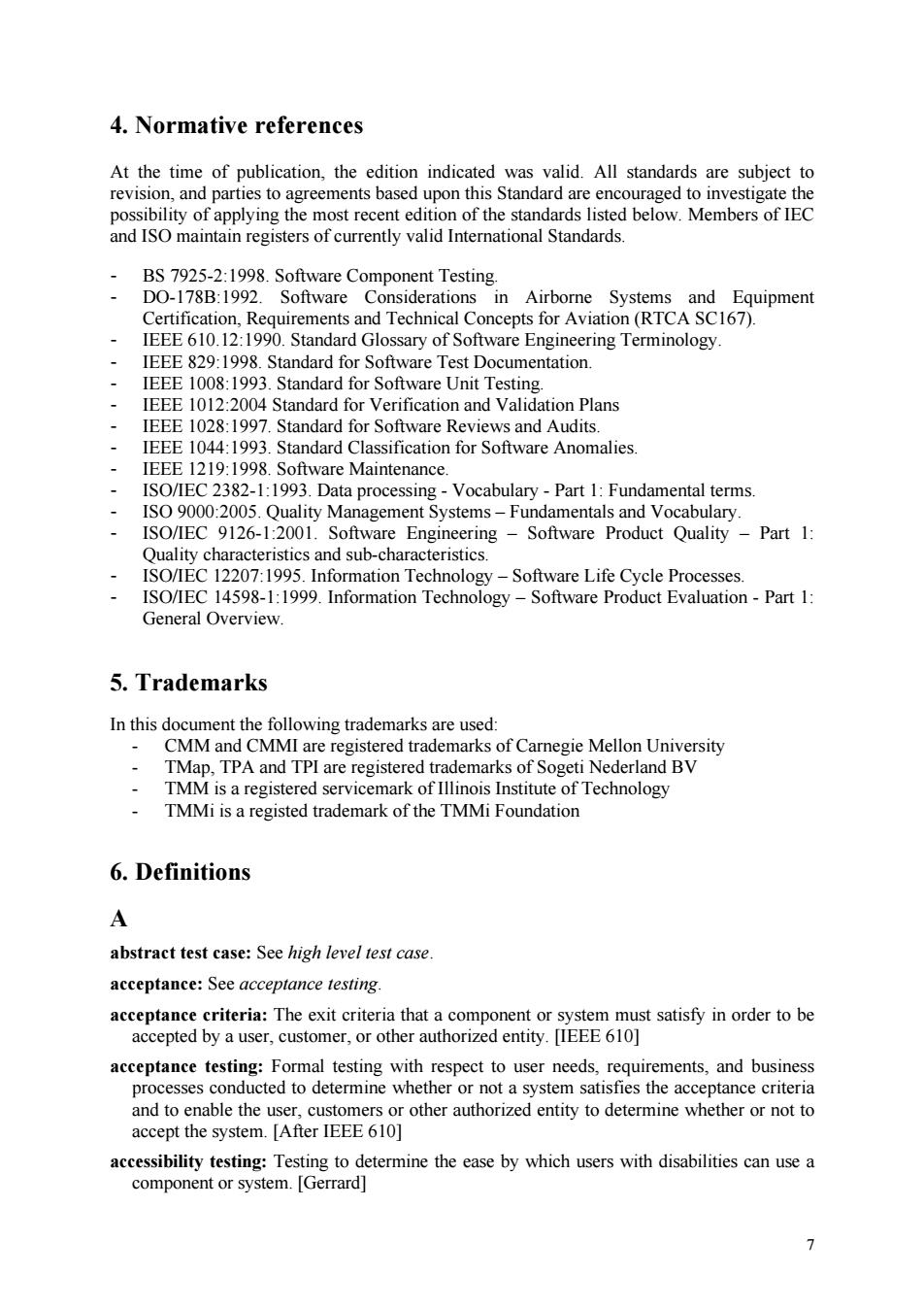正在加载图片...

4.Normative references At the time of publication the edition indicated was valid.All standards are subject to revision and par nts hased unon this standard are ate the possibility of applying the most recent edition of the standards listed below.Members of IEC and ISO maintain registers of currently valid International Standards. Softwar erao Airborne Systems a quipment 610.D.,1 ments a 71 ay of s for Aviation(RTC SC167 ware Engine tan 1EE1008-1993. ED1012.2004 ation Plans IEEE 1028:1997.Standard for Software Reviews s and audits IEEE 1044:1993.Standard Classification for Software Anomalies IFFF 1219-1998 Sof ware maintenance ISO/IEC 2382-1:1993.Data processing-Vocabulary-Part 1:Fundamental terms. ISO 9000:2005.Quality Management Systems-Fundamentals and Vocabulary. ISO/IEC 9126-1:2001.Software Engineering-Software Product Quality Part Quality characteristics and sub-characteristics. ISO/IE 12207:1995.Information Technology-Software Life Cycle Processes. ISO/IEC 14598-1:1999.Information Technology -Software Product Evaluation Part 1 General Overview 5.Trademarks In this document the following trademarks are used: CMM and CMMI are registered trademarks of Carnegie Mellon University TMap,TPA and TPI are registered trademarks of Sogeti Nederland BV TMM is a registered servicemark of Illinois Institute of Technology TMMi is a registed trademark of the TMMi Foundation 6.Definitions A abstract test case:See high level test case. acceptance:See acceptance testing. acceptance c must satisfy in order to be acceptance testing:Formal testing with respect to user needs,requirements,and business processes conducted to determine whether or not a system satisfies the acceptance criteria and to enable the user,customers or other authorized entity to determine whether or not to accept the system.[After IEEE 6101 :Testing todetermine the ase by which users with disabilities component or system.[Gerrard] 7 7 4. Normative references At the time of publication, the edition indicated was valid. All standards are subject to revision, and parties to agreements based upon this Standard are encouraged to investigate the possibility of applying the most recent edition of the standards listed below. Members of IEC and ISO maintain registers of currently valid International Standards. - BS 7925-2:1998. Software Component Testing. - DO-178B:1992. Software Considerations in Airborne Systems and Equipment Certification, Requirements and Technical Concepts for Aviation (RTCA SC167). - IEEE 610.12:1990. Standard Glossary of Software Engineering Terminology. - IEEE 829:1998. Standard for Software Test Documentation. - IEEE 1008:1993. Standard for Software Unit Testing. - IEEE 1012:2004 Standard for Verification and Validation Plans - IEEE 1028:1997. Standard for Software Reviews and Audits. - IEEE 1044:1993. Standard Classification for Software Anomalies. - IEEE 1219:1998. Software Maintenance. - ISO/IEC 2382-1:1993. Data processing - Vocabulary - Part 1: Fundamental terms. - ISO 9000:2005. Quality Management Systems – Fundamentals and Vocabulary. - ISO/IEC 9126-1:2001. Software Engineering – Software Product Quality – Part 1: Quality characteristics and sub-characteristics. - ISO/IEC 12207:1995. Information Technology – Software Life Cycle Processes. - ISO/IEC 14598-1:1999. Information Technology – Software Product Evaluation - Part 1: General Overview. 5. Trademarks In this document the following trademarks are used: - CMM and CMMI are registered trademarks of Carnegie Mellon University - TMap, TPA and TPI are registered trademarks of Sogeti Nederland BV - TMM is a registered servicemark of Illinois Institute of Technology - TMMi is a registed trademark of the TMMi Foundation 6. Definitions A abstract test case: See high level test case. acceptance: See acceptance testing. acceptance criteria: The exit criteria that a component or system must satisfy in order to be accepted by a user, customer, or other authorized entity. [IEEE 610] acceptance testing: Formal testing with respect to user needs, requirements, and business processes conducted to determine whether or not a system satisfies the acceptance criteria and to enable the user, customers or other authorized entity to determine whether or not to accept the system. [After IEEE 610] accessibility testing: Testing to determine the ease by which users with disabilities can use a component or system. [Gerrard]